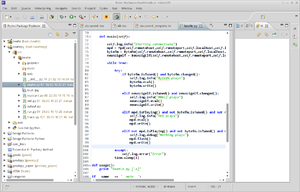This article relies too much on references to primary sources. (September 2011) |
 | |
 | |
| Original author(s) | Aleks Totic |
|---|---|
| Developer(s) | Appcelerator |
| Initial release | July 2003 |
| Stable release | 8.2.0[1] |
| Written in | Java, Python |
| Operating system | Cross-platform |
| Type | Integrated development environment |
| License | Eclipse Public License |
| Website | pydev |
PyDev is a third-party plug-in for Eclipse. It is an Integrated Development Environment (IDE) used for programming in Python supporting code refactoring, graphical debugging, code analysis among other features.
PyDev was originally created by Aleks Totic in July 2003, but Fabio Zadrozny became the project's main developer in January 2005. In September of that same year, PyDev Extensions was started as a commercial counterpart of PyDev, offering features such as code analysis and remote debugging.
In July 2008, Aptana acquired PyDev, retaining Zadrozny as the project head.[2] They open sourced PyDev Extensions in September 2009, and merged it with PyDev.[3]
When Appcelerator acquired Aptana in January 2011, they acquired PyDev by extension. Zadrozny was kept as head of the project.[4] Since then, development of PyDev has accelerated.
In March 2011, PyDev 2.0 was released with TDD actions support, and in April of the following year, version 2.5 was released with Django support. May 2013 saw a major milestone as PyDev raised more than its target in a successful crowd sourcing round to continue development, and version 2.7.5 was released. The campaign also funded Zadrozny's creation of LiClipse, a paid closed source fork of Eclipse which bundles PyDev by default.[5]
PyDev received improvements to type inference and a notable increase in contributions to code base when version 2.8 was released in July 2013.[6] Since then, numerous additional improvements have been made to PyDev and it has gained many positive reviews.[7][8]
Version 5.4.0 was released on November 30, 2016. The main new feature of this release is support for Python 3.6.[9]
Below there are some of the features available (version 2.7.5):
Until September 2009, two versions of PyDev existed: an open-source version, and a shareware version called PyDev Extensions. Certain advanced features such as code analysis, quick-fixes, and remote debugging were reserved for the non-free version. On September 3, 2009, Aptana announced PyDev version 1.5, a combined version of PyDev and PyDev Extensions, all available under the Eclipse Public License.
By: Wikipedia.org
Edited: 2021-06-18 15:18:27
Source: Wikipedia.org